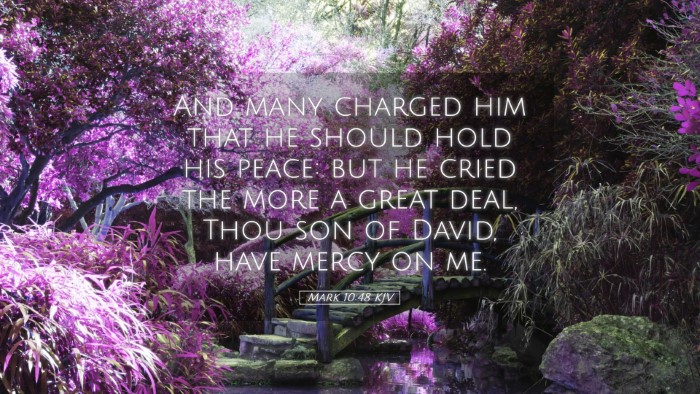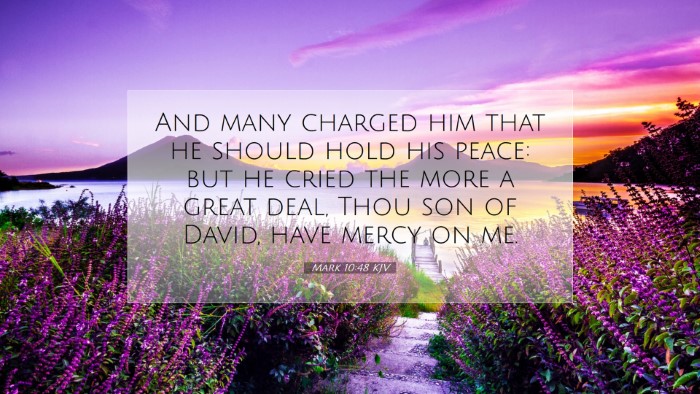Commentary on Mark 10:48
Mark 10:48 portrays a poignant moment in the Gospel, emphasizing both the desperation of the blind beggar, Bartimaeus, and the crowd's response to him. This verse reads:
“And many charged him that he should hold his peace: but he cried the more a great deal, Thou Son of David, have mercy on me.”
Contextual Overview
This verse takes place during Jesus' journey to Jerusalem, where he is approached by Bartimaeus, who is blind and in need of healing. The journey represents a critical moment in the ministry of Jesus as he is progressing towards his ultimate sacrifice. Bartimaeus' cry for mercy stands in stark contrast to the crowd’s admonition for him to be silent.
Exegesis
Several public domain commentaries provide insights into this rich narrative:
-
Matthew Henry: Henry emphasizes the boldness of Bartimaeus in his plea. He notes that despite the crowd’s attempts to silence him, Bartimaeus's faith propelled him to shout even louder. This illustrates a profound lesson on perseverance in faith when facing opposition, an important reminder for believers today.
-
Albert Barnes: Barnes points out the significance of Bartimaeus addressing Jesus as the "Son of David". This title not only recognizes Jesus' royal lineage but also highlights Bartimaeus' understanding of Jesus' authority and messianic identity. His cry for mercy is both a plea for physical healing and an acknowledgment of Jesus’ capability to provide spiritual salvation.
-
Adam Clarke: Clarke offers a critical analysis of the social dynamics at play. He discusses how the multitude, likely composed of those who followed Jesus out of curiosity, reflected a common societal tendency to marginalize the destitute and broken-hearted. Clarke underscores that Bartimaeus's insistence on calling for Jesus demonstrates his faith and desperation, a contrast to the apathy of the crowd.
Theological Insights
Mark 10:48 serves as a rich text for theological reflection:
-
Faith and Persistence: Bartimaeus exemplifies unwavering faith. His refusal to be silenced by the crowd communicates an important truth of the Christian faith: true faith persists despite external pressures and societal norms.
-
Mercy as a Central Theme: The appeal to Jesus’s mercy is a central theme in the Gospels. This verse encourages believers to approach Jesus with their needs, emphasizing that His compassion is always accessible. As church leaders, fostering an environment that encourages vulnerable expressions to God can be transformative.
-
Identity of Christ: The acknowledgment of Jesus as "Son of David" reinforces the importance of Christ's identity in the theological narrative. Understanding who Jesus is strengthens faith, providing a foundation for a reliance on His promises and authority.
Practical Applications
For pastors and Christians today, Mark 10:48 offers several practical applications:
-
Courage to Speak Up: Like Bartimaeus, we may face societal pressures that encourage silence regarding our faith. This passage inspires individuals to boldly proclaim their needs and faith in Jesus, spurring others to do the same.
-
Empathy for the Marginalized: Reflecting on the crowd's dismissal of Bartimaeus challenges believers to consider how they treat those who are marginalized. The church is called to be a sanctuary for the vulnerable, embodying Christ’s love and mercy.
-
Deepening Understanding of Jesus: Engaging with Christ's identity encourages deeper theological reflection and discipleship. Pastors can nurture their congregation’s understanding of who Jesus is, promoting a more profound trust in His nature and works.
Conclusion
Mark 10:48 is a testament to the transformative power of faith. It challenges believers to pursue Jesus with earnestness, regardless of external discouragements. The interplay of Bartimaeus’s faith, his recognition of Jesus’ messianic identity, and the contrasting behavior of the crowd provides rich terrain for spiritual reflection, teaching, and application in the church today.


